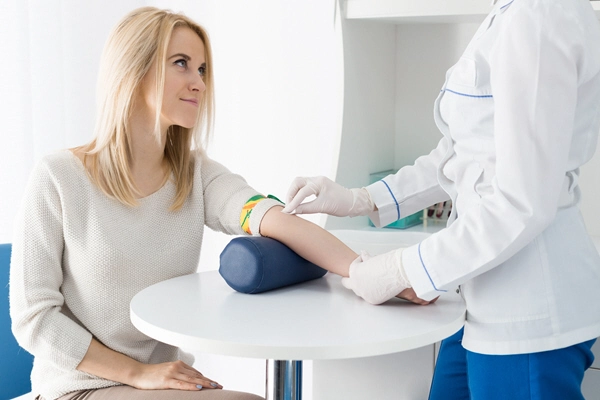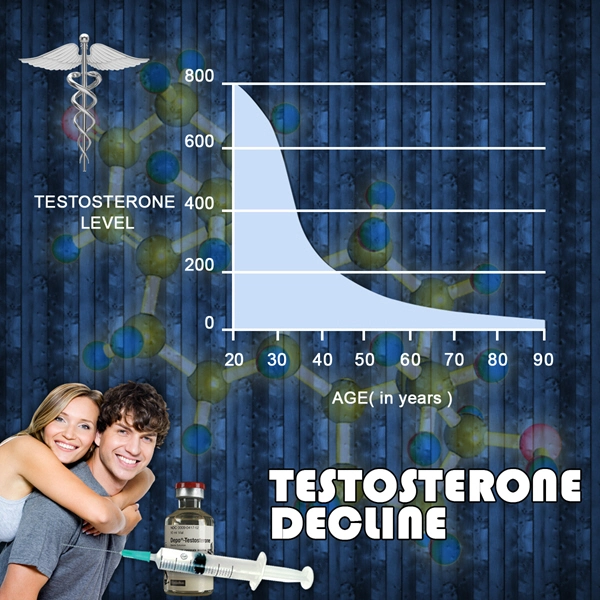Introduction
Testosterone, often celebrated for its role in male physical development, also plays a crucial part in psychological well-being. Recent studies have begun to shed light on how fluctuations in testosterone levels can influence mood and contribute to depression among American men. This article delves into the intricate relationship between testosterone and mood regulation, exploring its implications for mental health and potential therapeutic avenues.
The Biological Basis of Testosterone and Mood
Testosterone is not merely a hormone responsible for muscle mass and libido; it is also a key player in the brain's neurotransmitter systems. It influences the production and activity of serotonin and dopamine, neurotransmitters that are pivotal in regulating mood. Low levels of testosterone have been associated with reduced serotonin activity, which can lead to depressive symptoms. Moreover, testosterone receptors are found in areas of the brain associated with emotion and cognition, further highlighting its role in mood regulation.
Testosterone Levels and Depression in American Men
In the United States, depression affects millions of men, yet it often goes undiagnosed due to societal pressures and stigma. Research indicates that men with lower testosterone levels are at a higher risk of developing depression. A study published in the *Journal of Clinical Psychiatry* found that men with hypogonadism, a condition characterized by abnormally low testosterone, were more likely to experience depressive symptoms compared to their counterparts with normal testosterone levels.
The Age Factor: Testosterone Decline and Mood Changes
As men age, testosterone levels naturally decline, which can coincide with an increased prevalence of mood disorders. This age-related decline is not just a simple reduction in hormone levels but can lead to a cascade of physiological changes that affect mental health. Middle-aged and older American men, in particular, may find themselves battling mood swings and depression as their testosterone levels wane.
Therapeutic Interventions: Testosterone Replacement Therapy
Given the link between testosterone and mood, testosterone replacement therapy (TRT) has emerged as a potential treatment for men suffering from depression associated with low testosterone. TRT can help restore testosterone levels to normal, potentially alleviating depressive symptoms. However, it is crucial to approach TRT with caution, as it is not suitable for everyone and can have side effects. A comprehensive evaluation by a healthcare provider is essential to determine if TRT is an appropriate intervention.
The Sociocultural Context of Testosterone and Depression
In American society, traditional masculine norms can exacerbate the challenges men face with depression. The pressure to conform to these norms may lead men to ignore or downplay their symptoms, further complicating the relationship between testosterone and mood. Addressing these sociocultural factors is vital in understanding and treating depression in American men.
Future Directions in Research and Treatment
The field of testosterone and mood regulation is ripe for further exploration. Future research should aim to clarify the mechanisms by which testosterone affects mood and to identify subgroups of men who may benefit most from testosterone-based treatments. Additionally, developing non-hormonal interventions that can mimic the mood-enhancing effects of testosterone could provide alternative treatment options for men wary of TRT.
Conclusion
The role of testosterone in mood regulation is a complex and multifaceted issue, particularly in the context of depression among American men. Understanding this relationship can lead to more effective treatments and a better quality of life for those affected. As research continues to evolve, it is hoped that new insights will emerge, offering hope and healing to men struggling with the silent burden of depression.
In summary, testosterone's influence on mood and its potential role in treating depression in American men is an area of growing interest and importance. By acknowledging and addressing this connection, healthcare providers can offer more personalized and effective care, ultimately improving the mental health outcomes for men across the nation.

- Unlocking Vigor: Testosterone, The Quintessential Powering Force of Masculinity [Last Updated On: February 25th, 2025] [Originally Added On: February 25th, 2025]
- Hormonal Harmony: The Orchestra Conductor of Life - Testosterone [Last Updated On: February 26th, 2025] [Originally Added On: February 26th, 2025]
- A Chronological Expedition: Testosterone's Mysterious and Pivotal Voyage Across Human History [Last Updated On: February 27th, 2025] [Originally Added On: February 27th, 2025]
- The Unseen Power: Unveiling the Unsuspected Advantages of Robust Testosterone Levels [Last Updated On: February 28th, 2025] [Originally Added On: February 28th, 2025]
- Demystifying Testosterone: A Comprehensive Exploration of Fact and Fiction [Last Updated On: February 28th, 2025] [Originally Added On: February 28th, 2025]
- Harnessing the Vigor of Life: Decoding the Influence of Testosterone [Last Updated On: March 1st, 2025] [Originally Added On: March 1st, 2025]
- Exploring Nutritional Strategies for Testosterone Enhancement [Last Updated On: March 2nd, 2025] [Originally Added On: March 2nd, 2025]
- Enhancing Testosterone Levels Through Exercise: Mechanisms, Types of Exercises, and Age-Related Considerations [Last Updated On: March 3rd, 2025] [Originally Added On: March 3rd, 2025]
- Understanding Testosterone's Role in Cognitive Function and Mood [Last Updated On: March 4th, 2025] [Originally Added On: March 4th, 2025]
- Unveiling the Vital Role of Testosterone in Women's Health: A Comprehensive Overview [Last Updated On: March 4th, 2025] [Originally Added On: March 4th, 2025]
- Understanding Testosterone's Role in Male Health and Reproductive Function [Last Updated On: March 5th, 2025] [Originally Added On: March 5th, 2025]
- Genetics and Testosterone: Predestined Levels or Modifiable by Lifestyle? [Last Updated On: March 5th, 2025] [Originally Added On: March 5th, 2025]
- Testosterone's Crucial Role in Male Development and Health Across Lifespan [Last Updated On: March 6th, 2025] [Originally Added On: March 6th, 2025]
- Optimizing Testosterone Levels: Lifestyle Strategies for Health and Vitality [Last Updated On: March 7th, 2025] [Originally Added On: March 7th, 2025]
- Optimizing Men's Health: Advances in Testosterone Replacement Therapy and Personalized Approaches [Last Updated On: March 8th, 2025] [Originally Added On: March 8th, 2025]
- Managing Testosterone Decline in Men: Strategies for Health and Vitality as You Age [Last Updated On: March 9th, 2025] [Originally Added On: March 9th, 2025]
- Unveiling the Nightly Ritual: How Sleep Boosts Testosterone in American Men [Last Updated On: March 12th, 2025] [Originally Added On: March 12th, 2025]
- Unlocking the Potential of Testosterone: Pioneering Advances in Hormonal Health for American Males [Last Updated On: March 13th, 2025] [Originally Added On: March 13th, 2025]
- Unraveling the Interplay of Stress, Cortisol, and Testosterone: A Guide to Hormonal Harmony for American Males [Last Updated On: March 13th, 2025] [Originally Added On: March 13th, 2025]
- Unleashing Potential: The Role of Testosterone in Athletic Performance Among American Males [Last Updated On: March 15th, 2025] [Originally Added On: March 15th, 2025]
- Testosterone's Impact on Metabolism and Fat Burning in American Males [Last Updated On: March 18th, 2025] [Originally Added On: March 18th, 2025]
- Boosting Testosterone: Supplements, Herbs, Diet, and Exercise Strategies for American Males [Last Updated On: March 18th, 2025] [Originally Added On: March 18th, 2025]
- Testosterone's Impact on Heart Health in American Men: Risks, Therapy, and Lifestyle [Last Updated On: March 18th, 2025] [Originally Added On: March 18th, 2025]
- Testosterone's Crucial Role in Maintaining Bone Density in American Males [Last Updated On: March 19th, 2025] [Originally Added On: March 19th, 2025]
- Testosterone's Role in Enhancing Workplace Productivity and Cognitive Function [Last Updated On: March 19th, 2025] [Originally Added On: March 19th, 2025]
- Testosterone's Role in Male Libido: Strategies for Enhancing Sexual Health [Last Updated On: March 19th, 2025] [Originally Added On: March 19th, 2025]
- Low Testosterone in Men: Causes, Symptoms, and Effective Treatment Options [Last Updated On: March 20th, 2025] [Originally Added On: March 20th, 2025]
- Environmental Toxins and Their Impact on Testosterone Levels in American Males [Last Updated On: March 20th, 2025] [Originally Added On: March 20th, 2025]
- Testosterone's Impact on Mood, Memory, and Motivation in American Males [Last Updated On: March 21st, 2025] [Originally Added On: March 21st, 2025]
- Testosterone's Role in Immune Health and Protection in American Males [Last Updated On: March 21st, 2025] [Originally Added On: March 21st, 2025]
- Achieving Hormonal Harmony: Testosterone's Interplay in Men's Health [Last Updated On: March 22nd, 2025] [Originally Added On: March 22nd, 2025]
- Meditation's Impact on Testosterone Levels in American Males: Benefits and Practices [Last Updated On: March 22nd, 2025] [Originally Added On: March 22nd, 2025]
- Resistance Training Boosts Testosterone: Benefits and Strategies for American Males [Last Updated On: March 22nd, 2025] [Originally Added On: March 22nd, 2025]
- Navigating Testosterone Concerns: Preparation, Communication, and Management Strategies [Last Updated On: March 22nd, 2025] [Originally Added On: March 22nd, 2025]
- Optimal Testosterone Levels: Importance, Monitoring, and Natural Enhancement Strategies for American Males [Last Updated On: March 22nd, 2025] [Originally Added On: March 22nd, 2025]
- Testosterone's Role in Enhancing Cardiovascular Health in American Males [Last Updated On: March 23rd, 2025] [Originally Added On: March 23rd, 2025]
- Andropause: Understanding Male Menopause and Testosterone Decline in American Men [Last Updated On: March 23rd, 2025] [Originally Added On: March 23rd, 2025]
- Urban vs. Rural Living: Impacts on Testosterone Levels in American Males [Last Updated On: March 23rd, 2025] [Originally Added On: March 23rd, 2025]
- Testosterone Monitoring: Empowering Men with Health Apps and Wearables [Last Updated On: March 23rd, 2025] [Originally Added On: March 23rd, 2025]
- Intermittent Fasting: A Promising Method to Boost Testosterone in American Males [Last Updated On: March 24th, 2025] [Originally Added On: March 24th, 2025]
- Testosterone's Impact on Ambition and Competitiveness in American Men [Last Updated On: March 24th, 2025] [Originally Added On: March 24th, 2025]
- Testosterone Revolution: Redefining Masculinity and Health in the 21st Century [Last Updated On: March 24th, 2025] [Originally Added On: March 24th, 2025]
- Testosterone's Role in Muscle Recovery for American Males: Strategies and Insights [Last Updated On: March 24th, 2025] [Originally Added On: March 24th, 2025]
- Testosterone's Impact on Mental Health and Cognitive Function in American Men [Last Updated On: March 25th, 2025] [Originally Added On: March 25th, 2025]
- Boosting Testosterone: Diet, Exercise, Sleep, and Stress Management for American Males [Last Updated On: March 25th, 2025] [Originally Added On: March 25th, 2025]
- Hormonal Health for American Males: Understanding and Boosting Testosterone Levels [Last Updated On: March 25th, 2025] [Originally Added On: March 25th, 2025]
- Social Interactions Impact Testosterone Levels in American Males: Health Implications [Last Updated On: March 25th, 2025] [Originally Added On: March 25th, 2025]
- Testosterone's Role in Longevity: Insights for American Males [Last Updated On: March 25th, 2025] [Originally Added On: March 25th, 2025]
- Testosterone's Crucial Role in Enhancing Mental Resilience in American Men [Last Updated On: March 25th, 2025] [Originally Added On: March 25th, 2025]
- Music and Art Boost Testosterone in American Men: A Holistic Approach [Last Updated On: March 25th, 2025] [Originally Added On: March 25th, 2025]
- Testosterone Management for American Males: Lifestyle, Diet, and Medical Insights [Last Updated On: March 25th, 2025] [Originally Added On: March 25th, 2025]
- Boosting Testosterone: The Vital Role of Outdoor Activities for American Males [Last Updated On: March 26th, 2025] [Originally Added On: March 26th, 2025]
- Positivity Boosts Testosterone: Strategies for American Men's Hormonal Health [Last Updated On: March 26th, 2025] [Originally Added On: March 26th, 2025]
- Testosterone's Impact on Sleep: Strategies for American Males to Enhance Rest [Last Updated On: March 26th, 2025] [Originally Added On: March 26th, 2025]
- Boost Testosterone Naturally: Effective Home Workouts with Resistance Bands [Last Updated On: March 26th, 2025] [Originally Added On: March 26th, 2025]
- Modern American Diets and Their Impact on Men's Testosterone Levels: Strategies for Optimization [Last Updated On: March 26th, 2025] [Originally Added On: March 26th, 2025]
- Managing Testosterone Levels in American Males with Chronic Diseases: A Holistic Approach [Last Updated On: March 26th, 2025] [Originally Added On: March 26th, 2025]
- Testosterone's Impact on Body Image and Self-Esteem in American Males [Last Updated On: March 26th, 2025] [Originally Added On: March 26th, 2025]
- Testosterone Replacement Therapy: Benefits, Risks, and Long-Term Considerations for Men [Last Updated On: March 26th, 2025] [Originally Added On: March 26th, 2025]
- Personalized Testosterone Therapy: Tailoring Treatment to Genetic Profiles for American Men [Last Updated On: March 26th, 2025] [Originally Added On: March 26th, 2025]
- Testosterone's Influence on Risk-Taking in American Men: Biological and Cultural Insights [Last Updated On: March 27th, 2025] [Originally Added On: March 27th, 2025]
- Optimizing Testosterone: Sleep, Nutrition, Exercise, and Lifestyle for American Men's Health [Last Updated On: March 27th, 2025] [Originally Added On: March 27th, 2025]
- Testosterone's Impact on Cognitive Function in American Males: Insights and Implications [Last Updated On: March 27th, 2025] [Originally Added On: March 27th, 2025]
- Optimizing Testosterone with Vitamins D, Zinc, Magnesium, and K2 in American Males [Last Updated On: March 28th, 2025] [Originally Added On: March 28th, 2025]
- Economic Impact of Low Testosterone: Healthcare Costs, Productivity Loss, and Societal Burden [Last Updated On: March 28th, 2025] [Originally Added On: March 28th, 2025]
- Declining Testosterone in American Males: Trends, Causes, and Health Strategies [Last Updated On: March 28th, 2025] [Originally Added On: March 28th, 2025]
- Gut Health's Impact on Testosterone: A Guide for American Males [Last Updated On: March 29th, 2025] [Originally Added On: March 29th, 2025]
- Testosterone Research Evolution: From Lab Discoveries to Clinical Impacts on Men's Health [Last Updated On: March 30th, 2025] [Originally Added On: March 30th, 2025]
- Testosterone in Sports: Myths, Facts, and Future Research for American Males [Last Updated On: March 30th, 2025] [Originally Added On: March 30th, 2025]
- Testosterone's Impact on Male Skin, Hair Health, and Management Strategies [Last Updated On: March 31st, 2025] [Originally Added On: March 31st, 2025]
- Emerging Technologies Revolutionize Testosterone Optimization in Men's Health [Last Updated On: March 31st, 2025] [Originally Added On: March 31st, 2025]
- Testosterone's Impact on Immune Health: Insights for American Men's Well-being [Last Updated On: March 31st, 2025] [Originally Added On: March 31st, 2025]
- Alcohol and Smoking: Impacts on Testosterone Levels in American Males [Last Updated On: April 2nd, 2025] [Originally Added On: April 2nd, 2025]
- Testosterone's Crucial Role in Men's Sexual Health and Well-being [Last Updated On: April 3rd, 2025] [Originally Added On: April 3rd, 2025]
- Body Composition and Testosterone: A Guide for American Males' Health Optimization [Last Updated On: April 5th, 2025] [Originally Added On: April 5th, 2025]
- Mindfulness Boosts Testosterone: Meditation, Yoga, and Lifestyle for American Men's Health [Last Updated On: April 5th, 2025] [Originally Added On: April 5th, 2025]
- Testosterone's Role in Social Dominance Among American Males: Evolutionary and Modern Insights [Last Updated On: April 8th, 2025] [Originally Added On: April 8th, 2025]
- Seasonal Testosterone Fluctuations: Impact and Management Strategies for American Males [Last Updated On: April 8th, 2025] [Originally Added On: April 8th, 2025]
- Acupuncture's Role in Enhancing Testosterone Levels for American Males [Last Updated On: April 9th, 2025] [Originally Added On: April 9th, 2025]
- HIIT Boosts Testosterone: A Guide for American Males [Last Updated On: April 9th, 2025] [Originally Added On: April 9th, 2025]



List of USA state clinics - click a flag below for blood testing clinics.
Word Count: 622


















































